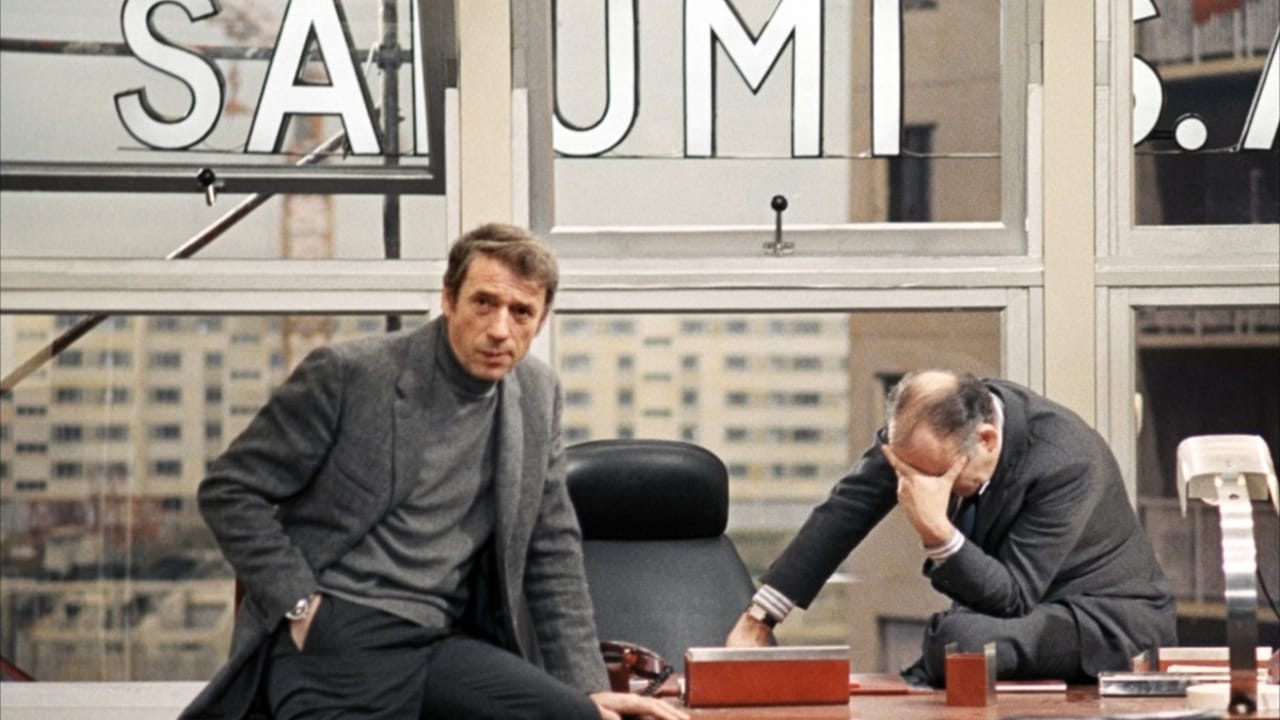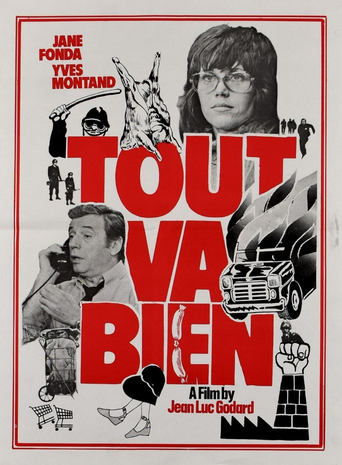writers_reign
As a huge admirer of Yves Montand both as singer and actor I knew that eventually I'd have to watch this even aware as I am that Godard is a joke who has just about sufficient talent to hold down a job cleaning toilets. Once again he demonstrates how actually anti-cinema he is with yet another political tract masquerading as entertainment. Though he hasn't a clue about how screenplays are constructed and films shot he is shrewd and in that capacity he has brought together two actors known as much for their off-screen political activism as their acting and clearly aware of his ineptness as a screenwriter he has assigned them roles that correspond to their public personas and in an attempt at spin he has made Montand a film director not a million miles from one J.L. Godard. With neither lead, or, for that matter, anyone in the cast, called on to do any actual acting, we can only rate them on how well they play themselves. At least I don't have to sit through it again.
RResende
Godard always makes me think. I'm never indifferent to what he does, with a few exceptions. But many times the excitement about a film by Godard comes in the days after i saw it. This is one of those cases.The setup is simple, he is working on the structural (re)invention of his own films. He probably was by than arrogant enough to believe he was working on the reinvention of the whole cinema (remember the "jean luc cinema godard" signature of Bande a part?). Well there are conclusions which came to affect other works by many other authors, but not always. I think this one is important as a milestone for Godard, in the great picture of his work and it is important to watch on the historical context of cinema than. Many things were happening in the beginning of the seventies, and the main issue was perhaps to clarify the meaning of cinema and its links to real life, the main question the nouvelle vague had raised but never satisfactory answered to that moment. So there are a few works from this period i think should be checked for they show different approaches from different contexts to a similar issue. Think about "F for fake" by Welles, "The conversation" by Coppola, "La nuit américaine" by Truffaut, a few years before Antonioni's Blow up. In the root of all this projects (and some others) is, to my view, this cinematic concern of understanding whether cinema represents life, stages life, or is pure fiction which may influence life. This is probably the least interesting answer of the works i mentioned, but it is still worth a look.The reason why i think this is less rewarding than the films i mentioned above is because Godard, at this point, tended to ruin partially his films by dulling the viewer with his childish half baked conceptions of political ideologies. So he doesn't focus so much on cinema as he does on politics. I like to believe that even than he had the notion of the lack of deepness in the ideas he depicts, but chose to understand that posture as a motivator of certain aesthetics conceptions. So, regarding cinema:The film is in itself a rough structure, which contains several rough structures inside. The result is that we are able to check the mechanics of all the issues we watch: film, politics, and personal relations. Of these three, the only one that matters is the issue film-making. All is denounced so, in the beginning, we have a shot in which someone signs checks to pay film-related services (photography, film, script, etc) followed by an off dialog translating a stylization of the beginning of the film making process. Than we get a beautiful hole sequence inside a factory. We see the factory as a section, so we are able to simultaneously get what happens in every division of it (this structural denouncement was to be used in different context by von Trier, with Dogville). Even before we are allowed to understand we are watching a set, never for a moment one believes to be watching a real location (the colors are those of the french flag). The performances by the workers are also ostensibly stagy, so one doesn't suspect we are watching real life being captured. So, fiction is announced. Like Truffaut in "la nuit américaine", Godard finally assumes that film has a kind of dynamics which has not that much to do with life, and the role of cinema is not to capture life, but to create a life of its own, which has roots in real world, but has its own inner laws.Than Godard ruins partially the experience. He assumes the political speech. He places still on the factory context several workers (actors performing workers, good to remember) unleashing terribly boring monologues (at least from by point of view, i'm not a May 68' guy, older folks please comment on this) concerning their rights and their complaints. He places the actors talking directly to the camera, assuming once more there is a filming being made. Later he even assumes we can make our own film, when he puts Montand talking side by side with a camera pointing at us.The third and clearly least worked out issue is the personal relation between Fonda and Montand. It is also told caring for the structure of the thing. So everything is stylish, cliché, but it is supposed to be like that. We end the film with possibilities on how their relation ends.This is a cinematic sketch, like the demo of a film. I like that attitude, i like the aspect of "unfinished" project, roughness, provisional look of the film. It's as if we were part of the process. And indeed we are.Oh and there is a shot, that alone makes this worth watching. The relatively famous shot on a supermarket. We have the camera moving for about 15 minutes over a straight line, we watch the normal life of a supermarket, stuff happening, a staged "ideological" fight. Just that. The camera comes and go, the line it follows is parallel to the line of register boxes which register the clients shopping. We see the things at the level of the registers box workers. It's just beautiful. It's cinema, maybe not the cinema of truth, but true cinema. Really.My opinion: 4/5
benoitlelievre
I really don't like Godard. He's getting on my nerves more than the usual filmmaker I don't like, because you can't let him aside. He did some very important stuff in cinema history, but I can't bear to watch his movie without swearing my head off.Tout va bien is interesting, don't get me wrong, but as usual in Godard movies, he takes over his own movie, he takes over his characters he makes them meaningless and only a visual example of a huge left wing message he's trying to fit in. Guess what Jean-Luc? I'm no left winger. To stay polite, watching this movie I felt like a foreign object entering into one of my body's orifices. Interesting situations, interesting filming, interesting experiments...but his political convictions are taking over the movie waaaaaaaay too much.I feel great that I watched this movie though. It has it's place in cinema history...and thank god, I don't have to watch it again. Godard is a necessary pain for everybody who wants to explore everything cinema has to offer.

